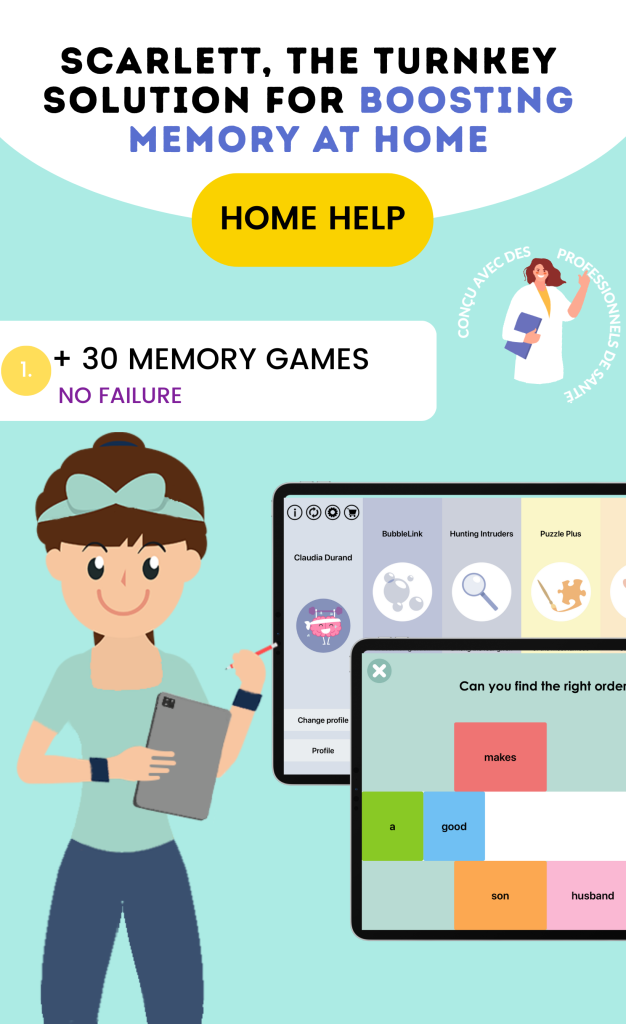Cognitive training, just like physical training, is not a universal discipline. Each mind is unique, with its own strengths, weaknesses, and ways of learning. For years, brain stimulation programs have offered a standardized approach, somewhat like a collective gym class where everyone performs the same movements, regardless of their level. Today, a silent revolution is underway, driven by artificial intelligence (AI). It promises to transform these generic programs into a tailored journey, an intimate and evolving coaching for your brain.Imagine a sports coach who doesn’t just give you a program but observes each of your movements, measures your fatigue, understands your limits, and adapts each exercise in real time to maximize your progress without ever discouraging you. This is precisely the role that AI is beginning to play in the field of cognitive health. Applications like CLINT, your brain coach, are no longer just collections of games but intelligent systems designed to sculpt a training program that is uniquely yours. This article explores how artificial intelligence has become the cornerstone of personalizing cognitive programs.Before diving into how AI works, it is essential to understand why personalization is so crucial for effective cognitive training. The brain is not a muscle like any other, but the metaphor remains relevant: to strengthen it, it must be challenged in a precise and targeted manner.
The Limitations of Traditional Approaches
The first generations of cognitive stimulation tools operated on simple principles. You would choose a game, often categorized (memory, logic, attention), and try to beat your best score. The difficulty increased in a linear and predictable manner: more items to memorize, less time to respond.This approach has several major drawbacks. First, it does not take into account your overall cognitive profile. You might spend hours on logic exercises, an area where you already excel, while neglecting your working memory that needs more attention. Second, the rigid progression can be a source of frustration. A jump in difficulty that is too significant can discourage you, while a level that is too easy quickly becomes boring and ineffective. It’s like trying to make everyone wear the same pair of shoes: it will be too big for some and too small for others, and rarely perfectly fitted.What is a Truly Personalized Program?
A truly personalized cognitive program goes far beyond simply adjusting difficulty. It is a dynamic ecosystem that adapts to you on multiple dimensions. It must be capable of:- Identifying your strengths and weaknesses: From the start, the system must evaluate your profile to understand where to focus efforts.
- Adapting difficulty in real time: Every response, every hesitation, every mistake is information. Difficulty must adjust not at the end of a session, but from one exercise to another, even from one question to the next.
- Offering a variety of targeted exercises: The program must draw from a large library of activities to specifically challenge the cognitive functions that need it most, while maintaining balanced training.
- Considering your state of fatigue or motivation: An intelligent system can detect signs of fatigue (longer response times, unusual errors) and suggest shorter, more playful exercises, or simply a break.
The Central Role of Artificial Intelligence
Artificial intelligence is not a magical concept. It is a set of tools and techniques, primarily based on algorithms, capable of analyzing vast amounts of data to draw conclusions and make decisions. In the context of cognitive training, its role is to transform your interactions with the application into an intelligent and continuous dialogue.Data Collection and Analysis: The Fuel of AI
Every time you use a cognitive training application like CLINT, you generate valuable data. AI is not only interested in whether your answer is right or wrong. It analyzes a multitude of micro-indicators:- The response time for each question.
- The nature of your mistakes (for example, in a memory game, do you forget the first or the last items?).
- Your progress over time on the same type of exercise.
- Your consistency and the regularity of your training.
- The types of exercises you perform best or, conversely, those you avoid.
Machine Learning Algorithms
This is where the magic happens. Machine learning algorithms are programs designed to learn from experience, without being explicitly programmed for each scenario. In our case, the algorithm observes your performance and begins to identify patterns. It understands that you are very quick with spatial reasoning tasks, but that your attention wanes after more than ten minutes of intense concentration exercises.Think of a very attentive personal tutor. At first, he offers you varied exercises to assess you. Quickly, he notices that you struggle with a certain type of math problem. He will not give you even harder problems, nor will he have you endlessly redo those you have mastered. Instead, he will suggest exercises that specifically target the skill you are lacking, gradually increasing the difficulty. This is exactly what AI does, but at a speed and with a precision that no human could match for thousands of users simultaneously.Dynamic Difficulty Adjustment
One of the most direct results of machine learning is the dynamic adjustment of difficulty. This adjustment aims to keep you in a state of "flow," a psychological concept where the challenge is high enough to be stimulating but not so much that it becomes insurmountable. This is the optimal learning zone.If you succeed in several working memory exercises in a row, CLINT’s system will not wait until the end of the session. It may, for the next exercise, add one more item to memorize or slightly reduce the allotted time. Conversely, if you make several mistakes, it will simplify the next task to help you regain confidence and reinforce the basics. This flexibility avoids the two major pitfalls of learning: boredom and discouragement.CLINT, Your Brain Coach: A Concrete Application of AI

How CLINT Uses AI to Create Your Unique Journey
From your first connection, CLINT does not let you navigate randomly. The process begins with an assessment phase. You complete a series of short exercises that cover different cognitive functions. AI immediately analyzes these initial results to establish your baseline cognitive profile. It identifies your relative strengths and the areas where improvement is possible.For example, the initial assessment may reveal that your logical reasoning is excellent, but that your mental flexibility (the ability to switch from one task to another) needs improvement. Based on this finding, the algorithm will construct your first training program. It will not ignore logic, but will place particular emphasis on games that challenge flexibility, integrating them progressively and balanced into your daily sessions.Real-Time Adjustment: A Coach That Learns With You
It is during daily use that CLINT’s AI shows its full power. Imagine that you are doing a concentration exercise where you need to identify a target shape among distractors. AI does not just count your correct answers.It observes that your performance declines when the distractors are similar in color to the target. It deduces a specific difficulty related to fine visual discrimination. For the next exercises of this type, it may either adjust this parameter (by gradually introducing closer colors) or suggest another game that works on this skill differently, to avoid creating a blockage. If it notes that your reaction times systematically slow down after 15 minutes of a session, it may suggest shorter but more frequent sessions. The system learns to know you and constantly refines its strategy, like a true coach.The Personalized Selection of Exercises
Thanks to the continuous analysis of your performance, CLINT does not just adjust the difficulty of a game. It also personalizes the sequence of games presented to you. Its algorithm constantly seeks the optimal balance for you. It ensures that you work on all major cognitive functions harmoniously while emphasizing the areas that need reinforcement. The application focuses on several key areas:- Memory: Working memory, visual memory, verbal memory.
- Attention: Selective attention, divided attention, concentration.
- Reasoning: Logic, problem-solving, planning.
- Language: Vocabulary, comprehension, verbal fluency.
- Visuo-spatial Functions: Orientation, spatial perception, mental visualization.
The Tangible Benefits of AI-Personalized Cognitive Training
The adoption of AI for personalization is not just a technological gimmick. It brings concrete advantages that radically change the effectiveness and appeal of cognitive training.Increased Motivation and Lasting Engagement
The main cause of dropout from training programs, whether physical or cognitive, is loss of motivation. The AI-driven personalized approach tackles this phenomenon at its root. By constantly maintaining the level of challenge in your optimal zone, it prevents frustration and boredom. Each session is perceived as an achievable challenge. The feeling of progress is more frequent, creating a virtuous circle: success fuels motivation, which in turn encourages consistency, the key to any sustainable learning.Optimized Efficiency: Targeting the Right Skills
Your time is precious. An AI-personalized program ensures that every minute spent training is used as effectively as possible. Instead of practicing skills you already master, you focus on those with the most potential for development. It’s the metaphor of the intelligent gardener: he will not water the plants that are already thriving in the sun, but will pay special attention to those showing signs of thirst, giving them precisely the amount of water they need to flourish.Measurable Results and Transparent Tracking
Artificial intelligence can process data to provide you with clear and understandable feedback on your progress. Applications like CLINT do not just give you a score. They show you progress graphs for specific skills, such as your "working memory capacity" or your "information processing speed." Seeing your own progress, quantified and visualized, is a powerful factor for positive reinforcement. It allows you to concretely understand the impact of your consistency and stay invested in your journey.◆ ◆ ◆




